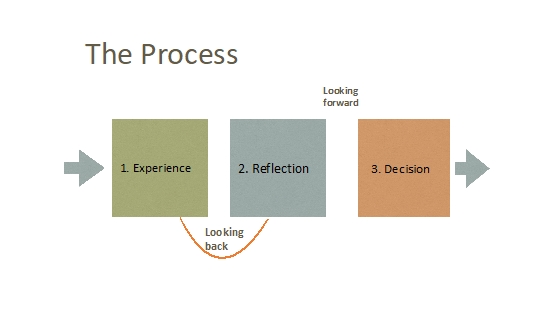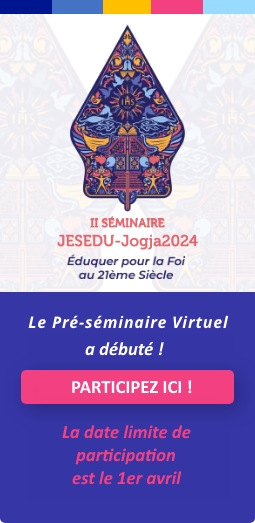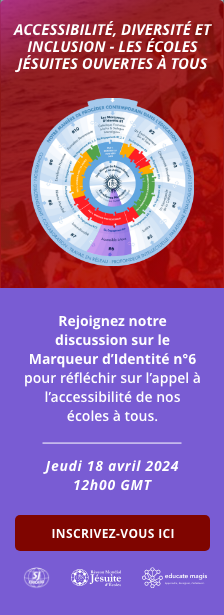Introduction
I remember a few years ago working on an Advent programme for a local parish and we were arranging a meeting after the event to reflect on how it had gone. One of the younger members of the team asked me what was the point “looking back on something that has already happened”. It was a good question, what is the point of looking back or reflecting, and what is the specifically Ignatian character of it? Is it just an exercise in nostalgia or is there a purpose or meaning, and what has it to do with prayer, spirituality or the divine?
How we are made
There is something uniquely human about consciousness and this capacity for reflection or self awareness. This consciousness gives us the ability to look at ourselves, to stand outside ourselves and evaluate our experience. Often modern culture has written off this aspect as ‘navel gazing’ or time wasting with its productive and consumerist emphasis. Even education itself can be overly focused on productivity and narrowly shaped by consumerism.
However, we have seen a recovery of this aspect of our humanity in recent years with the growth of meditation, self-awareness, holistic education and process-oriented psychology. Ignatian Spirituality has shown itself particularly useful in speaking to a post-modern world which focusses on experience, the gift of subjectivity, and which values the spiritual dimension of life. The Ignatian approach is remarkably practical, humanistic/holistic and helps people integrate feelings and emotions.
Starting Place
It begins with some startling theological assumptions: I am created by God, I am “fearfully and wonderfully made (Psalm 139)”, and God continues to communicate with me personally and uniquely. That is, God’s spirit dwells within me and I can uncover God’s love and leadings in the experience of my life. What is unique about Ignatian reflection is that it is based on discernment, recognizing that the Spirit is always working with us, both in our past experience and also in our future decisions or actions. In essence it is a pedagogical process: reflecting on experience and learning from it to make better decisions. This is quite a stunning claim with huge implications for education. Let’s look first at the actual experience of Ignatius of Loyola, upon which the whole system is built.
Ignatius forced into reflection
St Ignatius Loyola was a 16th Century Basque swashbuckling soldier who damaged his legs in a battle against the French. Humiliatingly, he had to be carried home on a stretcher and was forced to convalesce, the last thing he wanted. Long days of inactivity led to him daydreaming a lot, but he noticed his moods differed depending on what he thought about. Here are the words he dictated to his secretary:
…thinking of worldly matters he found much delight, but after growing weary and dismissing them he found that he was dry and unhappy. But when he thought of imitating the saints, he not only found consolation but even afterwards he remained happy and joyful. (my emphasis)
Extraordinarily, Ignatius noticed a relationship between the feelings or inner emotional states and the different types of daydreams. The contrasting moods or affective states that resulted were obviously deeply significant. Ignatius deduced that God was communicating directly with him, inviting him to reflect and make decisions, and ultimately led him to a profoundly different lifestyle. The heart of this particular insight was that his superficial desires (romantic, self-serving, egotistical day dreams) were not genuinely life-giving and resulted in unhappy, desolating feelings. However, his deepest desires (serving others, imitating the saints) were invigorating and rewarding and resulted in happy and consoling feelings.
Ignatius would go on to define these movements:
- consolation as an inner movement that stirs up feelings of peace, hope, and love, and orients us toward God and toward helping others
- desolation as the exact opposite, stirring up feelings of dryness and discontent, and orienting us away from God, the world or helping others.
Like a GPS buried inside us, it is possible to get guidance and direction by stopping being busy, creating a space, and looking at what is coming up within us. It was only in reflection, looking back over the experience, that Ignatius was able to sort out what was genuine. Similarly, for us, feelings and moods are messy, but with practice and some guidance it is possible to find a way of getting a good GPS reading and moving forward. The things that interfere with the signal are bad habits and superficial desires for comfort or affirmation, that all of us have to deal with. One of the goals of Jesuit education is helping young people to tune into their inner world, harnessing the power of affectivity/feelings, and being creative and courageous actors.
Reflection as Prayer
This was a new method of finding God and life in every aspect of living and the daily reality. It was based on simply reflecting or looking back on personal experience, and eventually, careful weighing of decisions to determine how one should love forward. Reflection is a way of praying; not what people normally understand by prayer as often one-way dialogue with God. But remember that the goal of prayer is not only to worship or adore but to do the will of God- to be a disciple and a follower, to put it into practice. In this sense reflection is very powerful prayer; it is about listening and making good decisions.

The goal of our lives is to be like Christ in the world, to put on the mind of Christ (Philippians 2:5–8) and to live like Jesus did: conscious of his dependence on the Father and figuring out how to follow God’s will in making God’s love tangible and the Kingdom a reality. Note that it is not enough to follow Christ’s teachings or ethical standards, though these are good things in themselves. Rather if we really believe in the humanity of Jesus and the consequences of the Incarnation (1 John 1:1-2), we are called to be imitators, followers and disciples of God, living our lives in the same pilgrim way that Jesus did, depending on the Father for everything and not getting too attached to any of the things of the world. As teachers we are called to be coherent and authentic witnesses of reflective practice in our own lives and inspiring it in that of our students. The world needs reflective, conscious and aware young people who are actors for positive change.
Contemplatives in Action
Remember that there is an inherent paradox in the Christian life that Jesus himself lived: how to be reflective, prayerful and peaceful while at the same time being engaged in the frenetic world of people, processes and culture. This tension is not easy to live and we often fall into one or other of the extremes, being too ‘quiet’ or removed, or alternatively being too busy and scattered. It takes a lot of work, planned reflection and prayer to be able to live this well, yet this inner and outward movement is central to being apostolically alive and centered. In the Ignatian world we call this being a ‘contemplative in action’; on one hand we are called to be contemplatives and nurture a life of prayer and reflection, while on the other we are called to engagement and often prophetic action that reflects our core Christian values. You can’t be a Christian on your own so we need to be part of concrete churches and communities, as well as engaging in society, culture and ordinary life. As a part of Jesuit schools, we are committed to a broad view of education and pedagogy that integrates reflection and affectivity/feelings into our classrooms, school ethos and vision for our graduates.
The Review of the Day (Examen)
An Ignatian technique called ‘Review of the Day (from the Latin word ‘Examen’; see https://www.ignatianspirituality.com/ignatian-prayer/the-examen) is really useful here as a practical and efficient way of building reflection into busy lives, normally it takes 15-20 minutes to do at the end of the day. The key insight is that by taking some time to reflect or look back on the complex and often hectic experience of our school day, we see things differently, often seeing things we have missed and appreciating the gift that is each day. We begin with trying to find gratitude within us for everything good that has happened, this helps shift often habitual negativity towards a more hopeful way of seeing that is more divine. Only then do we invite Jesus to watch our day replayed like a movie before us, seeing it as he sees it we realize the wonder of how God is alive in the world, exactly how we have been cooperating with God or not, and concretely how we could decide and act better in the future.
Progressively uncovering God’s will
The idea is not to beat ourselves up about failures or mistakes but to commit ourselves to living lives closer to what God wants. Looking back in reflection with God’s help it is easier to see our cooperation or the lack of it, with practice you can ‘feel’ or get a sense of what was good and genuinely from God, and the opposite. This fuels our commitment to living the next day in a more aware, discerning and proactive way, literally making our prayer active and alive. It takes practice and patience, but it works very effectively over time to make our Christian commitment a reality in terms of how we act and decide.
As teachers, our own personal reflection is a starting point, but also it involves helping to develop reflection in our students as part of the holistic Ignatian vision of developing well rounded individuals who are ‘people for others’. Jesuit schools with their adherence to the Ignatian Pedagogy based on Experience-Reflection-Action, should foster these reflective practices (many have adopted the Examen) and create spaces for reflection, sharing and discerning together for the good of the whole school community.
Questions for reflection:
-
How can I be a more reflective teacher?
-
How can I help my students be more reflective?
-
How can I implement the Ignatian Pedagogy in my classroom and in my school?
Se connecter ou Adhérer
pour créer et afficher des commentaires

